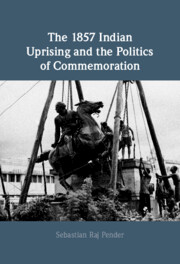Book contents
- The 1857 Indian Uprising and the Politics of Commemoration
- The 1857 Indian Uprising and the Politics of Commemoration
- Copyright page
- Dedication
- Contents
- Figures
- Acknowledgements
- Abbreviations
- Introduction
- 1 ‘Remember Cawnpore!’
- 2 ‘Forget Cawnpore!’
- 3 Negotiating Fear
- 4 The Mutiny of 1907
- 5 The War of Indian Independence
- 6 Remembering the Mutiny at the End of Empire: 1947–1972
- 7 Celebrating the First War of Independence Today
- Conclusion
- Bibliography
- Index
5 - The War of Indian Independence
A Struggle for Meaning, Memory, and the Right to Narrate
Published online by Cambridge University Press: 21 April 2022
- The 1857 Indian Uprising and the Politics of Commemoration
- The 1857 Indian Uprising and the Politics of Commemoration
- Copyright page
- Dedication
- Contents
- Figures
- Acknowledgements
- Abbreviations
- Introduction
- 1 ‘Remember Cawnpore!’
- 2 ‘Forget Cawnpore!’
- 3 Negotiating Fear
- 4 The Mutiny of 1907
- 5 The War of Indian Independence
- 6 Remembering the Mutiny at the End of Empire: 1947–1972
- 7 Celebrating the First War of Independence Today
- Conclusion
- Bibliography
- Index
Summary
Focusing on the anti-hegemonic discourses that developed over the course of the first decades of the twentieth century, Chapter 5 considers practises of memorialisation employed by Indian nationalist leaders to mark the rebellion. If the construction of monuments is an important technology of commemoration, then their alteration, subversion, and relocation are no less significant practices of memory. Focusing on how British sites of memory became the subject of a struggle for meaning, memory, and the right to narrate, this chapter charts the ways in which these mnemonic signifiers were co-opted by a range of groups and individuals to serve particular ideological purposes during the interwar years. Representing an as yet unconsolidated nationalist memory of the First War of Indian Independence, the debates that surrounded British built monuments help us better understand how the mutiny became a battleground, not only between Indian nationalists and the imperial administration but also between different nationalist thinkers who utilised these spaces of memory to negotiate and reimagine India’s past, present, and future with reference to the multiple forms resistance could take.
Keywords
- Type
- Chapter
- Information
- The 1857 Indian Uprising and the Politics of Commemoration , pp. 131 - 155Publisher: Cambridge University PressPrint publication year: 2022



